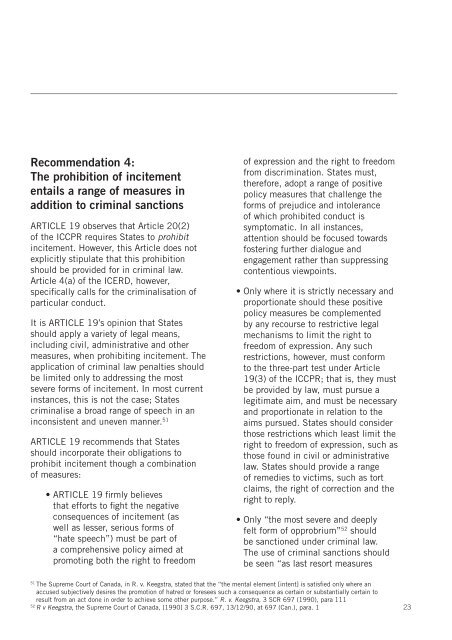ARTICLE-19-policy-on-prohibition-to-incitement
ARTICLE-19-policy-on-prohibition-to-incitement
ARTICLE-19-policy-on-prohibition-to-incitement
Create successful ePaper yourself
Turn your PDF publications into a flip-book with our unique Google optimized e-Paper software.
Recommendati<strong>on</strong> 4:<br />
The prohibiti<strong>on</strong> of <strong>incitement</strong><br />
entails a range of measures in<br />
additi<strong>on</strong> <strong>to</strong> criminal sancti<strong>on</strong>s<br />
<str<strong>on</strong>g>ARTICLE</str<strong>on</strong>g> <str<strong>on</strong>g>19</str<strong>on</strong>g> observes that Article 20(2)<br />
of the ICCPR requires States <strong>to</strong> prohibit<br />
<strong>incitement</strong>. However, this Article does not<br />
explicitly stipulate that this prohibiti<strong>on</strong><br />
should be provided for in criminal law.<br />
Article 4(a) of the ICERD, however,<br />
specifically calls for the criminalisati<strong>on</strong> of<br />
particular c<strong>on</strong>duct.<br />
It is <str<strong>on</strong>g>ARTICLE</str<strong>on</strong>g> <str<strong>on</strong>g>19</str<strong>on</strong>g>’s opini<strong>on</strong> that States<br />
should apply a variety of legal means,<br />
including civil, administrative and other<br />
measures, when prohibiting <strong>incitement</strong>. The<br />
applicati<strong>on</strong> of criminal law penalties should<br />
be limited <strong>on</strong>ly <strong>to</strong> addressing the most<br />
severe forms of <strong>incitement</strong>. In most current<br />
instances, this is not the case; States<br />
criminalise a broad range of speech in an<br />
inc<strong>on</strong>sistent and uneven manner. 51<br />
<str<strong>on</strong>g>ARTICLE</str<strong>on</strong>g> <str<strong>on</strong>g>19</str<strong>on</strong>g> recommends that States<br />
should incorporate their obligati<strong>on</strong>s <strong>to</strong><br />
prohibit <strong>incitement</strong> though a combinati<strong>on</strong><br />
of measures:<br />
• <str<strong>on</strong>g>ARTICLE</str<strong>on</strong>g> <str<strong>on</strong>g>19</str<strong>on</strong>g> firmly believes<br />
that efforts <strong>to</strong> fight the negative<br />
c<strong>on</strong>sequences of <strong>incitement</strong> (as<br />
well as lesser, serious forms of<br />
“hate speech”) must be part of<br />
a comprehensive <str<strong>on</strong>g>policy</str<strong>on</strong>g> aimed at<br />
promoting both the right <strong>to</strong> freedom<br />
of expressi<strong>on</strong> and the right <strong>to</strong> freedom<br />
from discriminati<strong>on</strong>. States must,<br />
therefore, adopt a range of positive<br />
<str<strong>on</strong>g>policy</str<strong>on</strong>g> measures that challenge the<br />
forms of prejudice and in<strong>to</strong>lerance<br />
of which prohibited c<strong>on</strong>duct is<br />
symp<strong>to</strong>matic. In all instances,<br />
attenti<strong>on</strong> should be focused <strong>to</strong>wards<br />
fostering further dialogue and<br />
engagement rather than suppressing<br />
c<strong>on</strong>tentious viewpoints.<br />
• Only where it is strictly necessary and<br />
proporti<strong>on</strong>ate should these positive<br />
<str<strong>on</strong>g>policy</str<strong>on</strong>g> measures be complemented<br />
by any recourse <strong>to</strong> restrictive legal<br />
mechanisms <strong>to</strong> limit the right <strong>to</strong><br />
freedom of expressi<strong>on</strong>. Any such<br />
restricti<strong>on</strong>s, however, must c<strong>on</strong>form<br />
<strong>to</strong> the three-part test under Article<br />
<str<strong>on</strong>g>19</str<strong>on</strong>g>(3) of the ICCPR; that is, they must<br />
be provided by law, must pursue a<br />
legitimate aim, and must be necessary<br />
and proporti<strong>on</strong>ate in relati<strong>on</strong> <strong>to</strong> the<br />
aims pursued. States should c<strong>on</strong>sider<br />
those restricti<strong>on</strong>s which least limit the<br />
right <strong>to</strong> freedom of expressi<strong>on</strong>, such as<br />
those found in civil or administrative<br />
law. States should provide a range<br />
of remedies <strong>to</strong> victims, such as <strong>to</strong>rt<br />
claims, the right of correcti<strong>on</strong> and the<br />
right <strong>to</strong> reply.<br />
• Only “the most severe and deeply<br />
felt form of opprobrium” 52 should<br />
be sancti<strong>on</strong>ed under criminal law.<br />
The use of criminal sancti<strong>on</strong>s should<br />
be seen “as last resort measures<br />
51<br />
The Supreme Court of Canada, in R. v. Keegstra, stated that the “the mental element [intent] is satisfied <strong>on</strong>ly where an<br />
accused subjectively desires the promoti<strong>on</strong> of hatred or foresees such a c<strong>on</strong>sequence as certain or substantially certain <strong>to</strong><br />
result from an act d<strong>on</strong>e in order <strong>to</strong> achieve some other purpose.” R. v. Keegstra, 3 SCR 697 (<str<strong>on</strong>g>19</str<strong>on</strong>g>90), para 111<br />
52<br />
R v Keegstra, the Supreme Court of Canada, [<str<strong>on</strong>g>19</str<strong>on</strong>g>90] 3 S.C.R. 697, 13/12/90, at 697 (Can.), para. 1<br />
23


